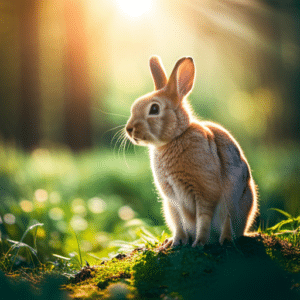Winter can make it difficult to keep our pet rabbit warm and comfortable, but there are a few easy things you can do to ensure your furry friend stays warm and healthy throughout the cold months.
In this blog post, we’ll explore some practical tips on how to care for your pet rabbit in colder climates, from warming up their hutch with thermal blankets or heat lamps to giving them plenty of hay, so they stay hydrated and protected from the elements.
We’ll also look at ways to offer your bunny mental stimulation as temperatures dip outside – because just like us humans, rabbits need more than just warmth during winter! Read on for helpful ideas that will help keep your cuddly friend cozy all season long.
Do pet rabbits need a heater in winter?
As the winter weather sets in, pet owners often wonder if their furry friends are staying warm enough. For rabbit owners, the question of whether or not to provide a heater may arise.
While rabbits are equipped with thick fur coats, they can still be susceptible to the cold. It is important to keep their living environment at a comfortable temperature, which may require a heater in colder climates. However, it is equally important to ensure proper ventilation to prevent overheating and poor air quality.
Ultimately, the best way to determine if your pet rabbit needs a heater in winter is to closely monitor their behavior and adjust as necessary.
What can I do for my pet rabbit in the winter?
As winter approaches, it’s important to ensure that your pet rabbit is comfortable and healthy during the colder months.
One of the best things you can do is to provide them with a warm and cozy living space. This can be achieved by placing their hutch in a sheltered area away from strong winds, filling it with plenty of soft bedding material, and even using a heat lamp if necessary.
Additionally, it’s important to make sure that your rabbit continues to receive a healthy diet and plenty of exercise, even if they are spending more time indoors. With a little extra care and attention, you can help your furry friend stay happy and healthy throughout the winter season.
How do I know if my rabbit is warm enough?
If you’re a proud owner of a rabbit, then it’s important to know how to keep your furry friend comfortable and cozy. One of the biggest concerns for rabbit owners is making sure their rabbit is warm enough, especially during colder months.
When assessing your rabbit’s warmth, you can check its ears, nose, and feet to make sure they are toasty. Additionally, you can monitor your rabbit’s behavior – if they are active and playful, then it’s a good sign that they’re feeling comfortable.
Lastly, make sure to provide plenty of cozy bedding and shelter options for your rabbit, so they have a place to snuggle up and stay warm. With these tips, you’ll know exactly how to keep your rabbit comfortable and happy all year round.
Should you cover rabbits at night?
Rabbits are adorable creatures who need adequate care to stay healthy and happy. One question that frequently comes up is whether they should be covered at night.
While it may be tempting to protect them from the cold, covering rabbits at night can do more harm than good. Rabbits are sensitive to changes in temperature and require a well-ventilated living environment.
Covering them with blankets or towels can cause them to overheat, which can be dangerous for their health. Additionally, rabbits are crepuscular animals, meaning they are most active at dawn and dusk. Covering them at night can disrupt their natural sleep patterns, leading to stress and behavioral problems.
So, while it may seem like a good idea to tuck your furry friend in at night, it’s best to let them regulate their own temperature and sleep schedule.
Do rabbits need sunlight in winter?
The winter months can be a challenging time for many animals, especially those who rely on sunlight for their well-being. So, do rabbits need sunlight in winter? The answer is a bit complicated.
While rabbits do require access to natural light, they don’t necessarily need direct sunlight. Too much sunlight can cause harm to their sensitive eyes. Instead, providing your furry friend with a brightly lit living space that mimics natural daylight patterns can help keep them healthy and happy throughout the winter months.
Whether through a sunny window or specialized lighting, giving your rabbit a little bit of light can go a long way in ensuring their well-being.
What is the best bedding for rabbits in the winter?
As the temperatures drop, it’s important to make sure your furry friends are staying warm and comfortable. When it comes to rabbits, choosing the right bedding is key. Opt for a material that is soft, absorbent, and able to provide insulation.
Good options include straw, hay, and paper-based bedding. While it may be tempting to go for something plush and cozy, like fleece, this can be harmful to your rabbit’s health as it can lead to respiratory issues.
Keep in mind that it’s also important to regularly clean and replace bedding to prevent any buildup of bacteria or odors. With the right bedding, your furry friend can cozy up all winter long.
Do rabbits need clothes in winter?
As winter approaches, pet owners may wonder if their furry friends need any extra protection from the cold. When it comes to rabbits, there is a common misconception that they need clothes to keep warm during the winter months. However, rabbits are well-equipped to handle the cold thanks to their thick fur coats and natural burrowing instincts.
Dressing a rabbit in clothes can hinder its ability to regulate its body temperature properly. Rather than bundling them up, providing your furry friend with plenty of hay, straw, and a snug bed to burrow into is the best way to keep them cozy and comfortable during the winter season.
Foil insulation for rabbit hutch
If you’re looking for a way to keep your bunny’s hutch warm during the colder months, foil insulation might be just what you need!
This clever material can help trap heat, helping your furry friend stay cozy and comfortable even when the temperature drops outside. Not only that, but foil insulation is also lightweight and easy to install, making it a convenient choice for busy pet owners.
With the right insulation, you can make sure your bunny has a warm and safe place to cuddle up in all winter long.
Can we bath rabbits in winter?
As the winter months approach, many pet owners may be wondering if it’s still safe to bathe their furry friends. When it comes to rabbits, it’s important to approach bathing with caution.
While rabbits can benefit from occasional showers to maintain their grooming needs, it’s crucial to make sure they don’t catch a cold or become too stressed in the process.
During the winter months, it’s best to limit baths to only when necessary and ensure that the rabbit remains in a warm, dry environment afterward. By taking proper precautions, bath time can remain a healthy and enjoyable part of your bunny’s grooming routine.
Can a bath kill a bunny?
As pet owners, we always want to make sure that our furry friends are safe and healthy. So it’s understandable to worry about whether certain things like baths can harm them. Many people wonder, “Can a bath kill a bunny?” The truth is that bathing your bunny can be risky and even detrimental to their health.
Bunnies have a delicate respiratory system that can easily become overwhelmed with stress, especially when it comes to water. In addition, bunnies can only regulate their body temperature through their ears and paw pads, so getting overheated in a bath is a real danger.
While bunnies do need grooming, a bath is usually unnecessary and potentially harmful.
Do rabbits like ice in their water?
Rabbits are adorable creatures that are often kept as pets. They require love, care, and attention just like any other animal. One question that rabbit owners may ask is whether or not rabbits like ice in their water.
While rabbits can drink water that is slightly chilled, it is not recommended to give them ice cubes as they can be a choking hazard. It is best to provide them with fresh, clean water that is at room temperature.
Additionally, it is important to ensure that your rabbit has access to plenty of water as dehydration can be a serious health concern for these furry friends. So, while rabbits may not particularly like ice in their water, they will surely appreciate a cool drink on a hot day.
How long can bunnies go without water in the winter?
Bunnies are adorable animals that many people choose to keep as pets. However, did you know that the needs of bunnies change during the winter?
In this season, bunnies need to be kept warm and dry, but what about their water needs? How long can bunnies go without water in the winter?
While it is true that rabbits can survive longer without water than many other animals, they still require regular access to clean and fresh water. During the winter months, it is important to ensure that your bunny has access to water at all times, to keep them healthy and hydrated.
So, if you’re a bunny owner, make sure to keep an eye on your furry friend’s water intake this winter season!
What do rabbits eat in the cold winter?
As the temperatures drop and winter sets in, you may be wondering what rabbits eat to stay nourished during the cold months. Despite the limited food options available, rabbits are incredibly resourceful and can survive on a variety of foods.
They have a keen sense of smell and use it to sniff out dormant plants hidden beneath the snow. Additionally, rabbits will eat tree bark, twigs, and other woody vegetation when other sources of food are scarce. They may also consume small amounts of grains or seeds left over in fields.
However, it’s important to supplement their diet with hay or fresh vegetables to ensure they’re getting all the necessary nutrients. With a little resourcefulness and adaptation, rabbits can thrive even in the coldest of winters.
How do I know if my rabbit is drinking enough water?
One of the most important things to keep in mind when caring for your rabbit is ensuring that they are staying hydrated. Rabbits need access to fresh water at all times, but how can you tell if they are drinking enough?
One clue is the frequency of their urine output. If your rabbit is producing urine regularly and maintaining a healthy litter box habit, that’s a good sign that they are drinking enough water.
Additionally, pay attention to their behavior and physical appearance. If your rabbit seems alert, and active and has a healthy coat, that’s a positive sign.
However, if you notice that your rabbit seems lethargic, has dry skin, or is experiencing digestive issues, it could be a sign of dehydration. Always make sure to provide your furry friend with fresh, clean water and monitor their behavior for any concerning changes.
How do you know if a rabbit is in pain?
Rabbits are fascinating creatures and we all want to ensure that they’re healthy and happy. However, it can be confusing to tell if they’re in pain since they often don’t show outward signs until they’re in a significant amount of discomfort.
Some subtle signs that your rabbit might be in pain include an inability to hop normally, not eating or drinking well, and hiding away from sight.
If you notice any of these signs, it’s always best to consult a veterinarian to get a professional diagnosis and treatment plan. Always keep a watchful eye on your furry friend and seek medical attention if you suspect any changes in their behavior or health.
Can rabbits die from cold?
Rabbits are known for their cuddly appearance and soft fur, but what happens when temperatures drop? Can these adorable creatures survive the cold?
Unfortunately, the reality is that rabbits can indeed die from extreme cold. While they do have a thick coat to keep them warm, they are still susceptible to hypothermia and frostbite in harsh conditions.
Owners must provide their furry friends with proper shelter, bedding, and warmth during cold weather to prevent such a tragedy. So, while rabbits may look cute and cuddly in the snow, it’s important to prioritize their safety and well-being during the winter months.
How do you save a cold rabbit?
If you ever find yourself with a cold rabbit on your hands, don’t panic! There are a few things you can do to help warm up your furry friend.
First, make sure they are in a warm and dry environment, away from any chilly drafts. You can also offer them a warm blanket or heat pad, but be sure to monitor their temperature closely to make sure they don’t overheat. Additionally, providing them with extra food and water can help fuel their body as they work to regulate their temperature.
Remember to always consult with a veterinarian if you have any concerns about your rabbit’s health. With a little love and care, your cold rabbit will be back to their happy and healthy self in no time!
Do rabbits not eat when cold?
As the temperature drops, many pet owners become concerned about their furry friends’ eating habits. This is especially true for rabbit owners who may have noticed their pet rabbits not eating as much during colder months. But do rabbits not eat when cold?
While it is true that rabbits may eat less when the temperature drops, it is not necessarily due to the cold itself. Other factors, such as changes in daylight hours, can contribute to a decrease in appetite.
As always, it’s important to pay attention to your pet’s eating habits and consult a veterinarian if you have concerns.
Last Thoughts about How to keep pet rabbits warm in Winter?
Keeping rabbits warm and safe during winter months is important to ensure their health and comfort. Having the right outdoor environment, plenty of bedding material, a warm hutch, and other essential items to protect rabbits from cold temperatures can make all the difference in your pet’s well-being.
Being aware of any changes in your rabbit’s behavior such as teeth grinding, lack of appetite and sleep, or increased aggression is important so that you can react quickly if needed.
If you have a rabbit who loves spending time outside and exploring new spots, providing them an enclosed area with extra layers of protection would be wise during the winter months.
Also, remember that a good diet with fresh foods along with regular exercise will help your bunnies stay fit so they can brave the cold days better.
Finally, pay special attention to options for bringing your pet inside if need be in cases where outdoor conditions become too extreme or just not suitable enough for them. By following these tips you can make sure that your furry friend has a comfortable winter!



